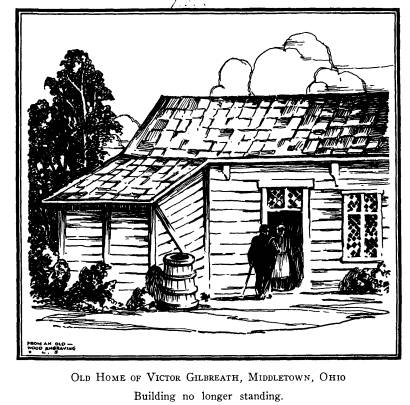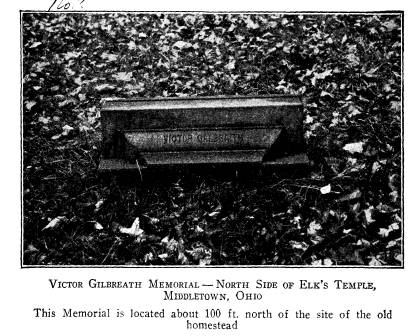Ohio History Journal
- 1
- 2
- 3
- 4
- 5
- 6
- 7
- 8
VICTOR GILBREATH*
BY C. B. GALBREATH
The war with Mexico, like all others,
had its side-
lights, its personal triumphs,
privations and tragedies
among the men in the ranks. Of course,
for the most
part these are lost to history.
Occasionally, however,
through some accidental circumstance
these are lifted to
the public view and endued with a
degree of enduring
fame not usually accorded to the
central figure of the
story.
The War of 1812 had its James Bird1;
the war with
Mexico had its Victor Gilbreath. The
former was made
famous through a ballad that became a
folk-song a cen-
tury ago; the latter has found an
enduring place in lit-
erature through a lyric by one of the
greatest of Amer-
ican poets, Henry Wadsworth Longfellow.
Just why Longfellow chose "Victor
Galbraith" as a
subject worthy of his pen does not seem
to be a matter
of record. The poem appeared in Putnam's Monthly
Magazine in 1855, without comment or explanatory
statement. The latest Cambridge edition
of Longfel-
low's poems contains only this
editorial note:
Victor Galbraith was a bugler in a
company of volunteer
cavalry and was shot in Mexico for some
breach of discipline. It
is a common superstition among soldiers
that no balls will kill
them unless their names are written on
them. The old proverb
says: "Every bullet has its
billet".
* From The History of
Ohio, by C. B. Galbreath, Vol. I, pp. 590-594.
1 See Ohio Archaeological and
Historical Publications, Vol. XX, pp.
418-421.
(575)
|
576 Ohio Arch. and Hist. Society Publications Victor Gilbreath has often been thought an imagin- ary character. The fact that he was a real personage and a native of Ohio is ample warrant for this sketch, especially since the site of the humble home in which he was born at Middletown, this state, is marked by a mon- |
|
|
|
ument erected by the local lodge of one of the prominent fraternal orders of the United States. There has been issued in printed form, with a cut of Victor Gilbreath's birthplace on the front cover, a neat pamphlet containing what purports to be a true story of |
Victor Gilbreath 577
"Victor Gilbreath." It is
well written, in popular style.
The opening paragraphs are an index to
the entire story:
The terrors of the siege had subsided,
the soldiers had de-
parted, the plains of Monterey no longer
resounded with the roar
of musketry, the clash of arms or the
wild alarms of cruel war.
The forces of General Ampudia were
scattered in flight.
The city had surrendered to the Army of
General Taylor, which
now pursued its onward course to greater
conquests and more
glorious achievements.
The land was desolate, the ravages of
war having left its
trail of ruin. The blackness of despair
threw a shadow of gloom
over city and country far and near.
The birds had left their accustomed
haunts and fled afar;
the stillness of life cast a depressing
influence over all. Monterey
was indeed a stricken city. But while
suffering from its wounds
the proud spirit of the native, though
subdued, was not broken.
He would hide his scars, he would efface
the marks that told of
disaster, that no trace of the invader's
heel should mar the en-
vironment of the Castilian in the land
of the Montezumas.
The substance of the story as related
in the pam-
phlet is to the effect that
"Victor Galbraith", a musician
and a lover of music, because of his
association with a
lady minstrel of Portuguese birth, who
came from the
City of Monterey with a harp, to play
and sing for the
American soldiers, was supposed to have
been a spy;
and it was reported that Victor
Gilbreath had imparted
to her army secrets which she reported
to the enemy.
On this false charge he was
court-martialed, found
guilty of treason, and executed. This
is the basis of the
romantic story as related by the author
of the pamphlet.
The true story is somewhat different.
To begin
with, the central figure of this tragic
event was not Vic-
tor Galbraith or Victor Gilbraith, but
Victor Gilbreath
-- an immaterial variant, but worthy of
note in this con-
nection. He was born in Middletown,
Ohio, about the
year 1823. The late Governor James E.
Campbell
Vol. XXXV -- 37
578
Ohio Arch. and Hist. Society Publications
stated that his mother was a pupil in
the school attended
by Victor Gilbreath and that he had
frequently heard
her speak of him; that she said he was
a harmless, good-
natured sort of fellow, but that she
did not quite under-
stand why the great Longfellow should
write a poem
about him.
The Gilbreath family moved to Mineral
Point, Wis-
consin, in 1841. Victor was a tailor by
trade and be-
cause of his musical talent and social
qualities, became
a general favorite with the young
people of the place.
The instrument of which he was
especially fond was the
flute.
Early in 1843 the family moved to
Galena, Illinois.
Here the drink habit into which he had
fallen grew upon
him and new associates led him to
gambling. At the
opening of the war with Mexico, Albion
T. Crow, of
Galena, organized Company F of the
First Regiment of
Illinois Volunteers for service.
Gilbreath wished to
join the company and was urged to do so
by Captain
Crow, against the protests of
Gilbreath's mother, who
feared that his drink habit would prove
his ruin in the
army. Crow, who knew his failing,
promised to look
carefully after him and see that no
harm came to him
because of his infirmity. So long as he
was under Cap-
tain Crow all went well.
The company was discharged at Camargo,
and Gil-
breath re-enlisted as bugler in Captain
Gaston Means'
company of volunteer cavalry. And now
began his
troubles, which later reached a tragic
culmination.
Though good-natured when sober,
Gilbreath was violent
when under the influence of drink. His
new captain
made no allowance for this and
evidently considered him
Victor Gilbreath 579
a disturbing element, which he
undoubtedly was when
intoxicated, rather than a real menace
to the life of the
captain. The result was that he was
court-martialed,
found guilty of habitual drunkenness
and threatening
the life of his captain, and the order
was issued for his
execution. He did not deny the charges
of which he
was found guilty, but truly stated that
he had committed
the offenses only when he was under the
influence of
drink.
The romantic story of the lady minstrel
has little
foundation in fact. Gilbreath was not
executed for "re-
vealing army secrets" or for
"treason". The execution
"under the walls of Monterey"
on December 27, 1847,
seems to have been not only a tragic
but a gruesome af-
fair. "He fell before the firing
squad," we are told,
"and was placed in his coffin,
which was left uncov-
ered". Before the hour for burial,
his comrades were
horrified to see him arise with the
blood streaming from
his wounds and call for a drink of water.
This was
given him, after which he pleaded to be
shot and relieved
of his pain. A second volley from the
firing squad was
effective. Perhaps it should be added
here that, sobered
by his impending fate, Victor Gilbreath
met death with
firmness and composure.
The poem by Longfellow, so far as it
relates to the
execution, is a vivid description of
what actually oc-
curred. By special permission from the
publishers it is
here quoted in full:
Victor Galbraith
Under the walls of Monterey
At daybreak the bugles began to play,
Victor Galbraith!
580 Ohio Arch. and Hist. Society Publications
In the mists of the morning damp and
gray,
These were the words they seemed to say:
"Come forth to thy death,
Victor Galbraith!"
Forth he came, with a martial tread;
Firm was his step, erect his head;
Victor Galbraith!
He who so well the bugle played,
Could not mistake the words it said;
"Come forth to thy death,
Victor Galbraith!"
He looked at the earth, he looked at the
sky,
He looked at the files of musketry,
Victor Galbraith!
And he said with a steady voice and eye,
"Take good aim; I am ready to
die!"
Thus challenges death
Victor Galbraith.
Twelve fiery tongues flashed straight
and red,
Six leaden balls on their errand sped;
Victor Galbraith
Falls to the ground; but he is not dead;
His name was not stamped on those balls
of lead,
And they only scath
Victor Galbraith.
Three balls are in his breast and brain,
But he rises out of the dust again,
Victor Galbraith!
The water he drinks has a bloody stain;
"Oh kill me, and put me out of my
pain!"
In his agony prayeth
Victor Galbraith.
Forth dart once more those tongues of
flame,
And the bugler has died a death of
shame,
Victor Galbraith!
His soul has gone back to whence it came
And no one answers to the name,
When the sergeant saith,
"Victor Galbraith!"
|
Victor Gilbreath 581 Under the walls of Monterey By night a bugle is heard to play, Victor Galbraith! Through the mists of the valley damp and gray The sentinels hear the sound, and say, "That is the wraith Of Victor Galbraith!"2 |
|
|
|
In concluding his contribution on the subject of this sketch, the writer of the pamphlet to which reference has been made says: And now the grave has closed over all who acted a part in that eventful day, the curtain of oblivion is drawn on the scene and Victor Galbraith, whose bugle blast echoes down the passing years, through the poet's narrative of his tragic death, is held in remembrance only through the traditions that cluster around his name in the old home town. 2 This poem is here printed by permission of the publishers, Houghton Mifflin Company. |
|
582 Ohio Arch. and Hist. Society Publications The stone on which his name is inscribed and which marks the location of the paternal roof, is one that the government re- jected in the erection of the federal building, hard by the old homestead, and it therefore becomes a fitting monument to one who had mistakenly suffered the same treatment from his native country as that of the stone erected to his memory. His grave, unknown and unmarked in the fields of Mexico, the rejected stone mid the scenes he knew and loved stands the only monument to his memory, and the traveler on his way over the Dixie Highway, seeking places of historic interest, as he stands over the stone beside the Elks' temple in Middletown, will recall the pathetic story of Victor Galbraith, sleeping peacefully in an unknown grave on the plain of Monterey. Victor Gilbreath did not "mistakenly" suffer. He was the victim of a habit that then found little restraint in the army and he died under a discipline that was not tempered by the mercy of later times. |
|
|
VICTOR GILBREATH*
BY C. B. GALBREATH
The war with Mexico, like all others,
had its side-
lights, its personal triumphs,
privations and tragedies
among the men in the ranks. Of course,
for the most
part these are lost to history.
Occasionally, however,
through some accidental circumstance
these are lifted to
the public view and endued with a
degree of enduring
fame not usually accorded to the
central figure of the
story.
The War of 1812 had its James Bird1;
the war with
Mexico had its Victor Gilbreath. The
former was made
famous through a ballad that became a
folk-song a cen-
tury ago; the latter has found an
enduring place in lit-
erature through a lyric by one of the
greatest of Amer-
ican poets, Henry Wadsworth Longfellow.
Just why Longfellow chose "Victor
Galbraith" as a
subject worthy of his pen does not seem
to be a matter
of record. The poem appeared in Putnam's Monthly
Magazine in 1855, without comment or explanatory
statement. The latest Cambridge edition
of Longfel-
low's poems contains only this
editorial note:
Victor Galbraith was a bugler in a
company of volunteer
cavalry and was shot in Mexico for some
breach of discipline. It
is a common superstition among soldiers
that no balls will kill
them unless their names are written on
them. The old proverb
says: "Every bullet has its
billet".
* From The History of
Ohio, by C. B. Galbreath, Vol. I, pp. 590-594.
1 See Ohio Archaeological and
Historical Publications, Vol. XX, pp.
418-421.
(575)
(614) 297-2300


